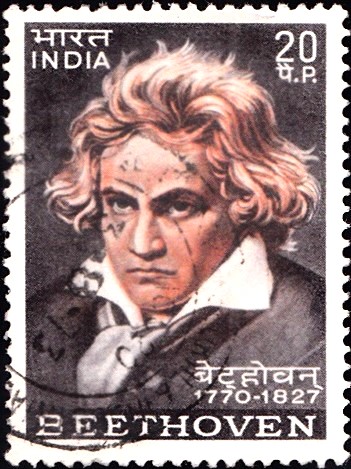
India on Ludwig van Beethoven
A commemorative postage stamp on the Birth Bicentenary of Ludwig van Beethoven, a German composer and pianist :
 Issued by India
Issued by India
Issued on Dec 16, 1970
Issued for : This year, the whole world celebrated the 200th birth anniversary of this most famous composer. For India to honour the memory of Beethoven that year was not only a most appropriate act, but it was one more gesture cementing the bonds of friendship between the people of India and the people of Germany. The P&T Department feels privileged in bringing out a special commemorative stamp to honour one of the greatest musicians and composers of the West, Ludwig van Beethoven.
Description of Design : The design of the stamp is vertical and depicts a portrait of Ludwig van Beethoven.
Type : Stamp, Postal Used
Colour : Orange & Suede Grey
Denomination : 20 Paise
Overall Size : 3.91 X 2.90 cms.
Printing Size : 3.56 X 2.54 cms.
Perforation : 13 x 13
Watermark : Printed on unwatermarked adhesive stamp paper
Number Printed : 30,00,000
Number per issue sheet : 35
Printing Process : Photogravure
Designed and Printed at : India Security Press
Name : Ludwig van Beethoven
Born on Dec 16, 1770 at Bonn, Germany
Died on Mar 26, 1827 at Vienna, Austria
About :
- Ludwig Van Beethoven (1770-1827), the German composer who gave to Western Classical music some of its most creative pieces, was born in Bonn two centuries ago. In Germany and other European countries concerts and festivals were being held to commemorate the bicentenary of this musical genius. India, along with the rest of the world celebrates his bicentenary during November-December, 1970.
- Born in a family of court musicians on December 16, 1770, Beethoven was subjected to a rigorous musical discipline from the age of four so that he could fulfil his father’s expectation in becoming a piano prodigy and child composer. The great Mozart after meeting the child prodigy said, “Pay attention to this young man, he will cause a stir in the world one day“. At 17, he became an organist at Bonn‘s Electoral Court and gave his first composition. In his 22nd year, he gave a new expression to piano, displaying a style that changed the piano aesthetics. His compositions too were recognised at this time. In the following 33 years, Beethoven enamoured his audiences through concerts and devoted himself to musical compositions. Sieders, quartets, sonatas and symphonies received his feverish attention which one estimate places at 7,500 pages of manuscript.
- Belonging to the age of the French Revolution and Napoleonic era, he basically acquired a republication disposition. But partly because of the suppression in him due to pedagogical experiments in childhood and because of the dissatisfaction with the times, he was often aloof, grumbling and given to emotional outbursts. Beethoven suffered from partial deafness which later made him unable to hear his own compositions. A passionate hiker and lover of nature, he wandered in the countryside taking notes. Yet the musical genius in him endeared him to all. The legendary halo around him was evident at the time of his death when on March 24, 1827, 20,000 commoners, princes and nobles vied with each other to pay him their last respects.
- Beethoven was a tone poet and a musical counterpart of Shakespeare. In his approach to music he was a classicist who shaped humanity in all phases of expression. Goethe once said about him, “I have never seen an artiste more collected and intense.“
- Beethoven was by far the most towering personality in Western music. Not only was he a great innovator and a supreme creative genius whose influence is felt to this day but he was most deeply occupied with the fundamental problems of the human spirit. He believed that music was not just a form of entertainment but had a great role to play in stirring the human spirit to its roots and inspiring men to nobler heights.
- Unlike any other great composer or artiste of the West, he was deeply interested in the religious teachings of India and his working room was covered with quotations from German translations of the great Hindu scriptures. One such quotation reads : “Brahma, his spirit is existent in itself. He, the mighty one, is present in every part of space – his omniscience dwells alone by itself and the conception of him comprehends every other one. Thou alone art the truly blessed one (Bhagavan); Thou, the essence of all laws, the image of all wisdom, present throughout the universe. Thou sustainest all things. Sun, Ether, Brahma.“


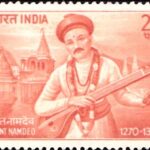
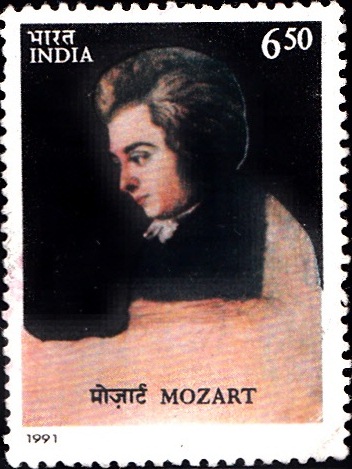
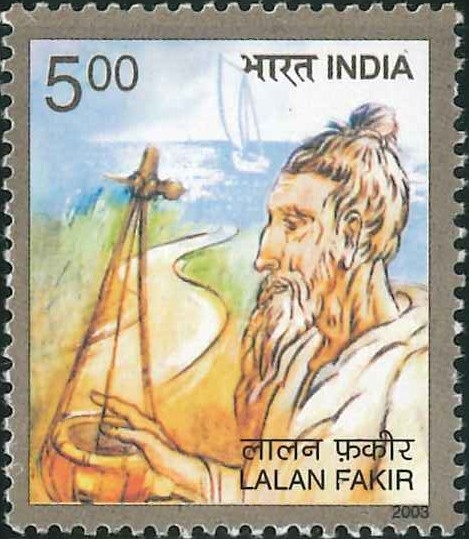
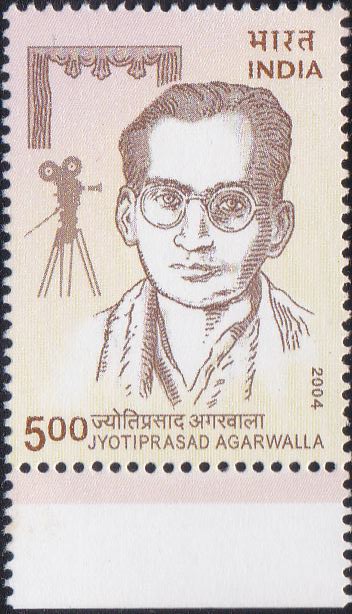
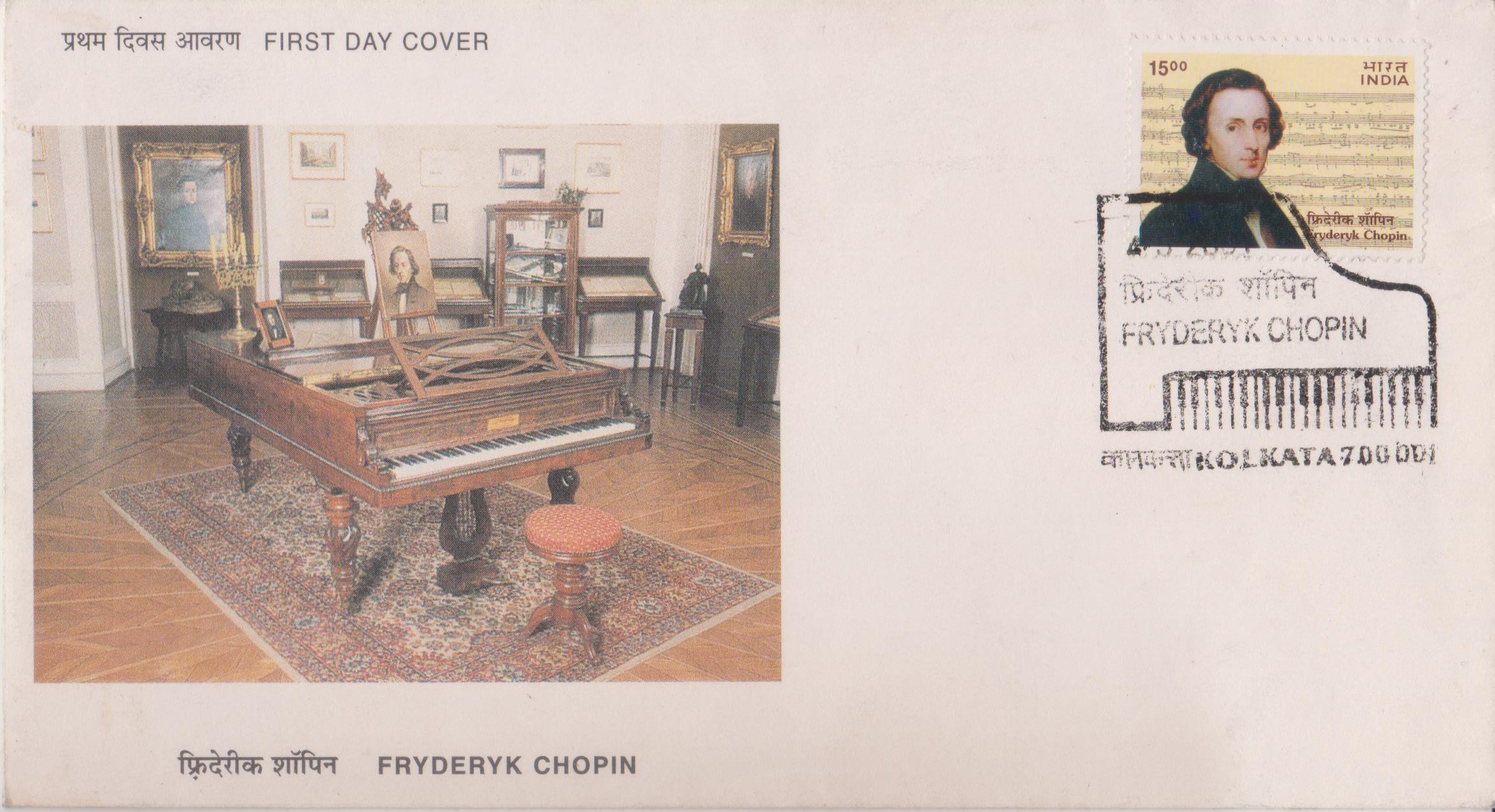
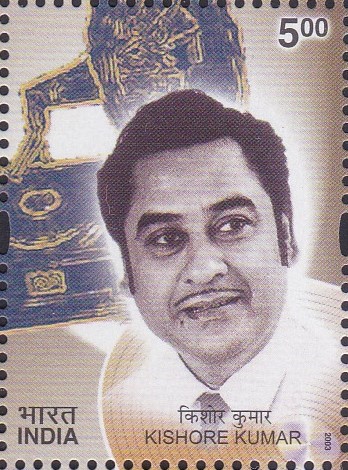
[…] The popular idea that Handel‘s style is easily recognisable comes from the fact that he over-shadows all his predecessors and contemporaries except Bach. Actually Handel‘s style is the apotheosis of the typical Italian style of the 18th century. The effects of Handel‘s original inspiration upon foreign material are really the best indication of the range of his style and the effects of his influence on the great musical geniuses who followed him, such as Beethoven. […]
[…] his death in 1828, a year after the death of Beethoven, whom he idolised, Schubert was buried beside Beethoven, two great geniuses nurtured in the […]